Questões de Língua Inglesa da Fundação CESGRANRIO (CESGRANRIO)
Lista completa de Questões de Língua Inglesa da Fundação CESGRANRIO (CESGRANRIO) para resolução totalmente grátis. Selecione os assuntos no filtro de questões e comece a resolver exercícios.
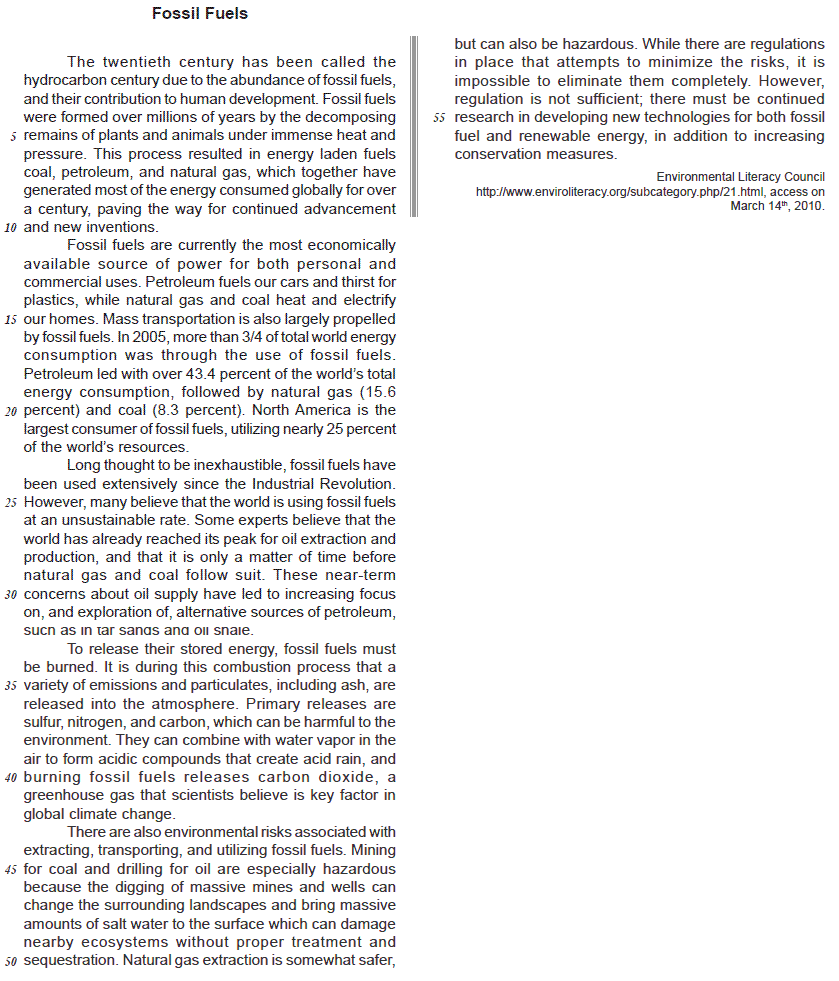
In The twentieth century has been called the hydrocarbon century due to the abundance of fossil fuels, and their contribution to human development. (lines 1-3), due to can be substituted by
- A.
such as
- B.
besides
- C.
in spite of
- D.
instead of
- E.
because of
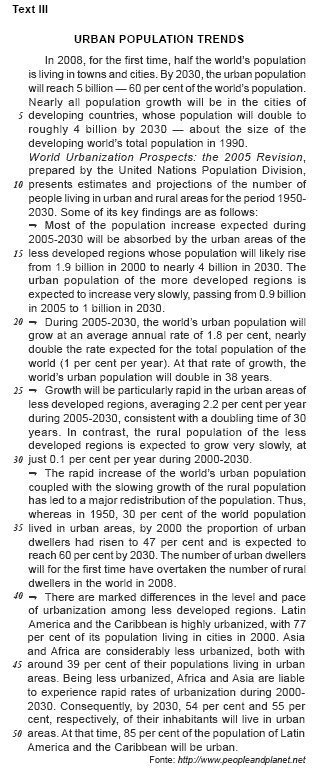
The only correct conclusion we may derive from Text III is that, by 2030,
- A.
the world's rural population in developing countries is unlikely to have grown at all.
- B.
Africa and Asia will probably face a very slow increase in the total number of their city dwellers.
- C.
Latin America and the Caribbean are expected to face a very dramatic rise in their urban population rates.
- D.
less developed regions of the globe will have around twice as many urban inhabitants than thirty years before.
- E.
the world's urban population in more developed nations will certainly stagnate, remaining in the same levels as in 1990.
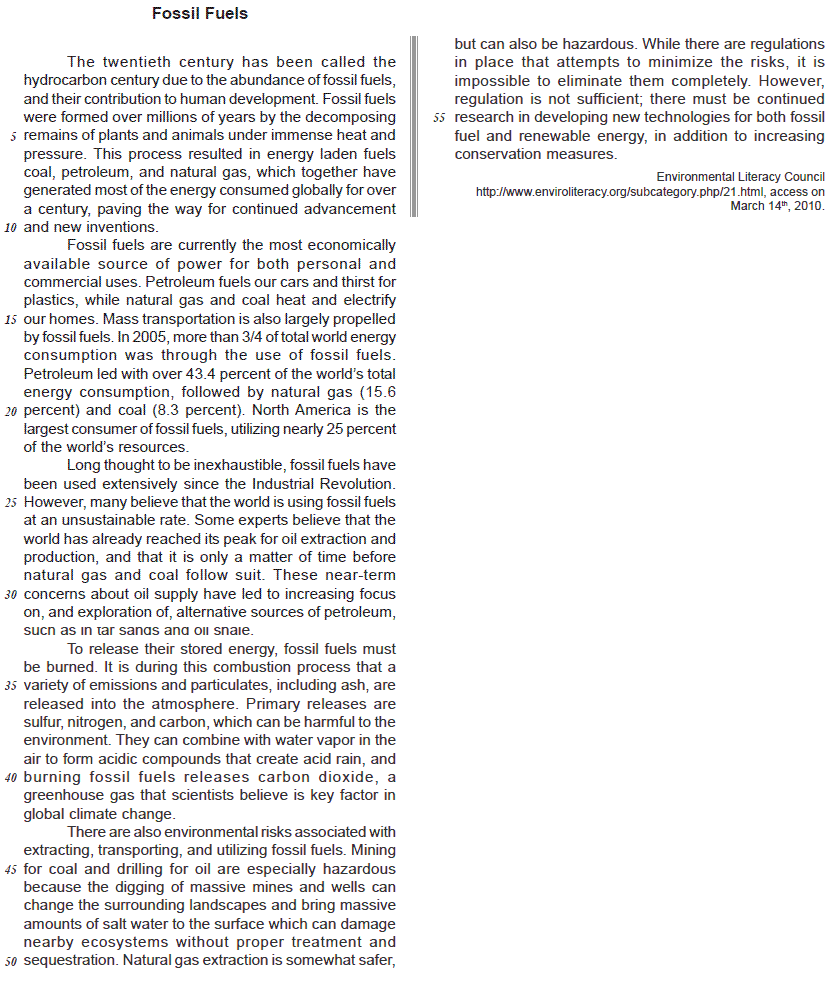
This process... (line 6) refers to the
- A.
decrease of the energy produced by fossil fuels.
- B.
discovery of natural resources millions of year ago.
- C.
artificial decomposition of plants, animals and natural gas.
- D.
disintegration of plants and animals under extremely cold conditions.
- E.
deterioration of the remains of living beings caused by heat and pressure.
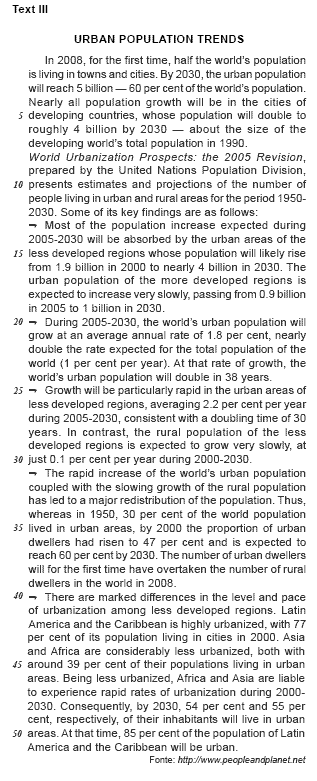
"Although predicting the future is always risky, we can be fairly certain of the general trends now expected in global population in the next few decades. The world will add billions to its population, through additions made almost exclusively in the world's poorer nations. This can only be expected, since developing countries already represent most of the world's population. These anticipated changes, that now seem almost inevitable, loom large as the backdrop against which today's policy choices are to be made, both in and out of government."
Global and U.S. National Population Trends - by Carl Haub Consequences. Vol. 1, No. 2, Summer 1995.
The only passage in Text III that directly supports the predictions anticipated in the fragment above is
- A.
"By 2030, the urban population will reach 5 billion – 60 per cent of the world's population." (lines 2-3).
- B.
"Most of the population increase expected during 2005-2030 will be absorbed by the urban areas of the less developed regions whose population will likely rise from 1.9 billion in 2000 to nearly 4 billion in 2030." (lines 13-16).
- C.
"During 2005-2030, the world's urban population will grow at an average annual rate of 1.8 per cent, nearly double the rate expected for the total population of the world (1 per cent per year)." (lines 20-23).
- D.
"In contrast, the rural population of the less developed regions is expected to grow very slowly, at just 0.1 per cent per year during 2000-2030." (lines 28-30).
- E.
"The rapid increase of the world's urban population coupled with the slowing growth of the rural population has led to a major redistribution of the population." (lines 31-33).
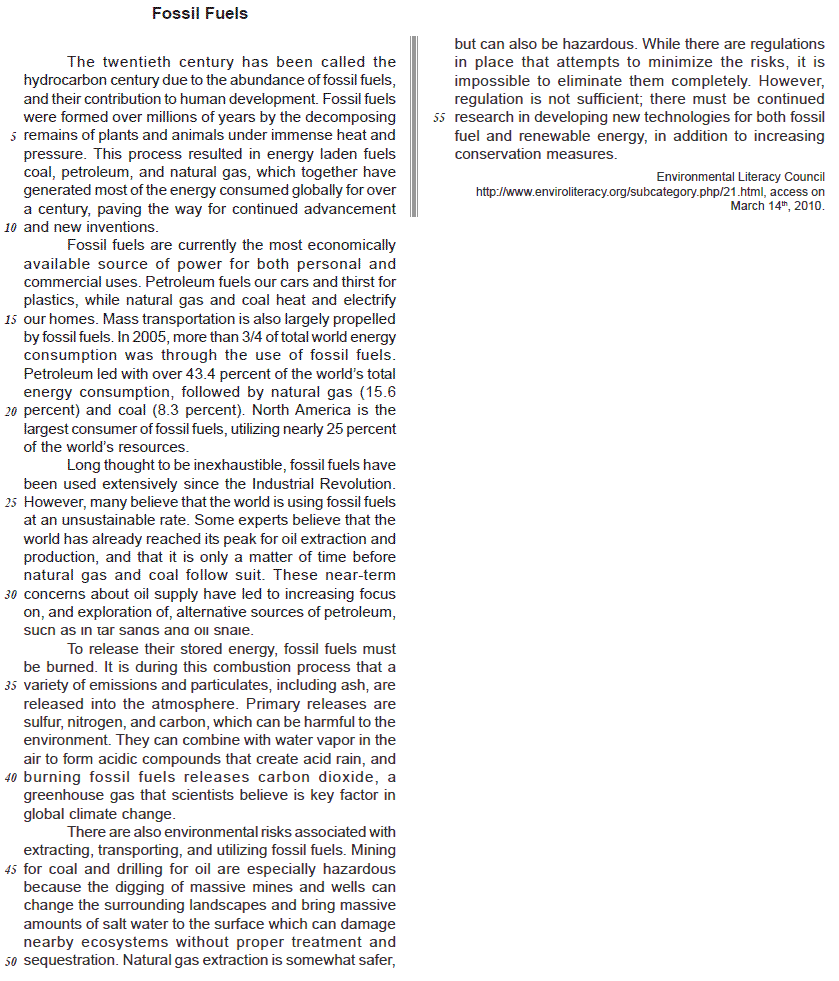
Paragraph 3 (lines 23-32) introduces the idea that
- A.
oil reached the maximum volume of sales last century.
- B.
alternative sources of fuel are being employed at their peak capacity.
- C.
the world consumption of fossil fuels has been growing uncontrollably.
- D.
natural gas and coal are not suitable as replacements of oil in industrial settings.
- E.
fossil fuels emerged as the major energy source long 50 before the Industrial Revolution.
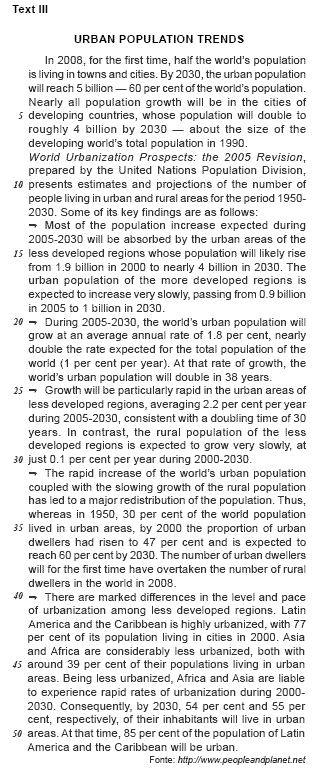
The rhetorical structure of the sentence %u201CThe rapid increase of the world%u2019s urban population coupled with the slowing growth of the rural population has led to a major redistribution of the population.%u201D (lines 31-33) can be correctly described as one of
- A.
listing and classification.
- B.
comparison and contrast.
- C.
problem and solution.
- D.
cause and effect.
- E.
time sequence.
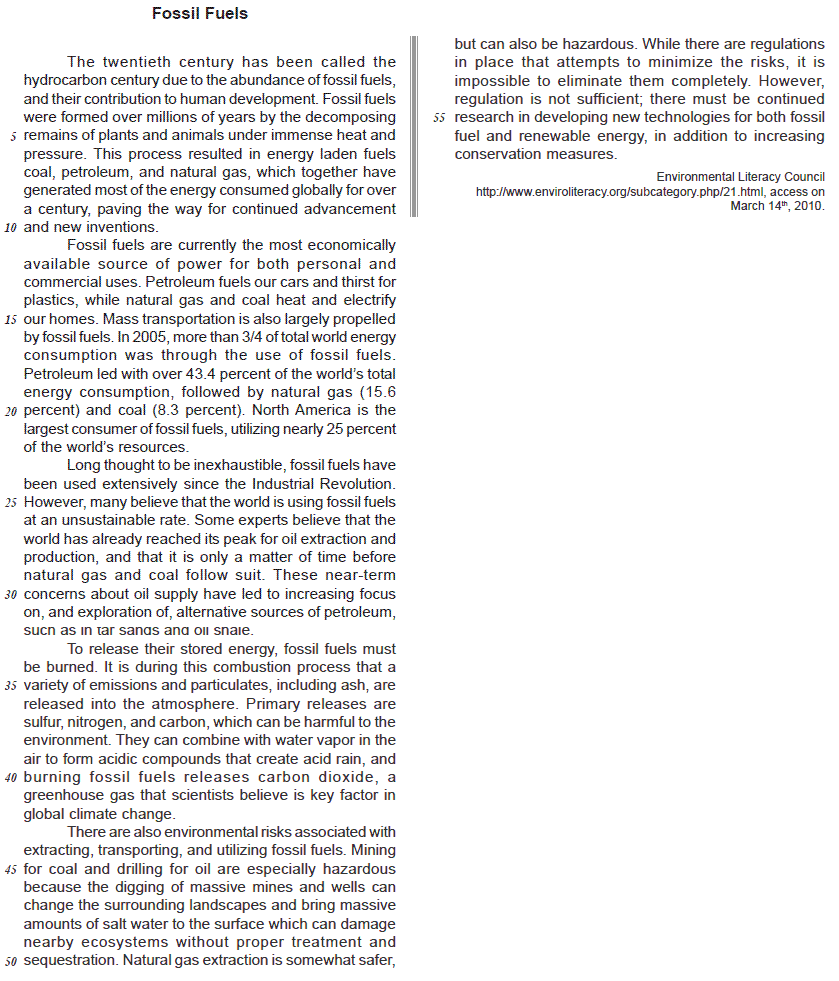
Concerning the figures relative to the year 2005, as mentioned in paragraph 2 (lines 11-22)
- A.
more than 3/4... (lines 16) refers to the quantity of fossil fuels reserves consumed along the year.
- B.
...over 43.4 percent... (line 18) refers to the share that oil represents in the overall quantity of energy consumed globally.
- C.
15.6 percent (lines 19-20) refers to the amount of natural gas resources annually consumed in North America.
- D.
8.3 percent (line 20) refers to the share of coal used only for heating American homes.
- E.
...nearly 25 percent... (line 21) indicates the percentage of fossil fuels saved in North America.
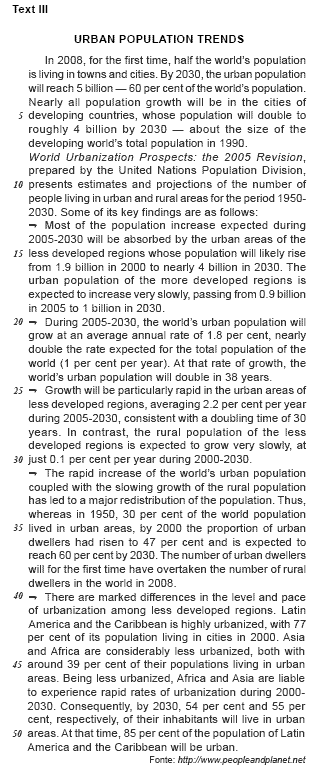
"Nearly all population growth will be in the cities of developing countries, whose population will double to nearly 4 billion by 2030." (lines 4-6) The only option that CANNOT be considered an appropriate semantic equivalent for the sentence above is
- A.
Praticamente todo o crescimento demográfico será registrado em cidades situadas em países em desenvolvimento, cuja população dobrará, atingindo quase 4 bilhões em 2030.
- B.
Aproximadamente a totalidade do crescimento populacional se dará em cidades de países em desenvolvimento, cujo número de habitantes dobrará para cerca de 4 bilhões até 2030.
- C.
Quase todo o crescimento demográfico ocorrerá em cidades de países em desenvolvimento, que terão sua população duplicada para aproximadamente 4 bilhões até o ano de 2030.
- D.
A maior parte do crescimento populacional será observado nas cidades localizadas em países em desenvolvimento, cuja população dobrará de tamanho, chegando a quase 4 bilhões em 2030.
- E.
Grande parte do crescimento demográfico ficará concentrado em cidades de países que estão se desenvolvendo, nos quais a população de quase 4 bilhões duplicará em 2030.
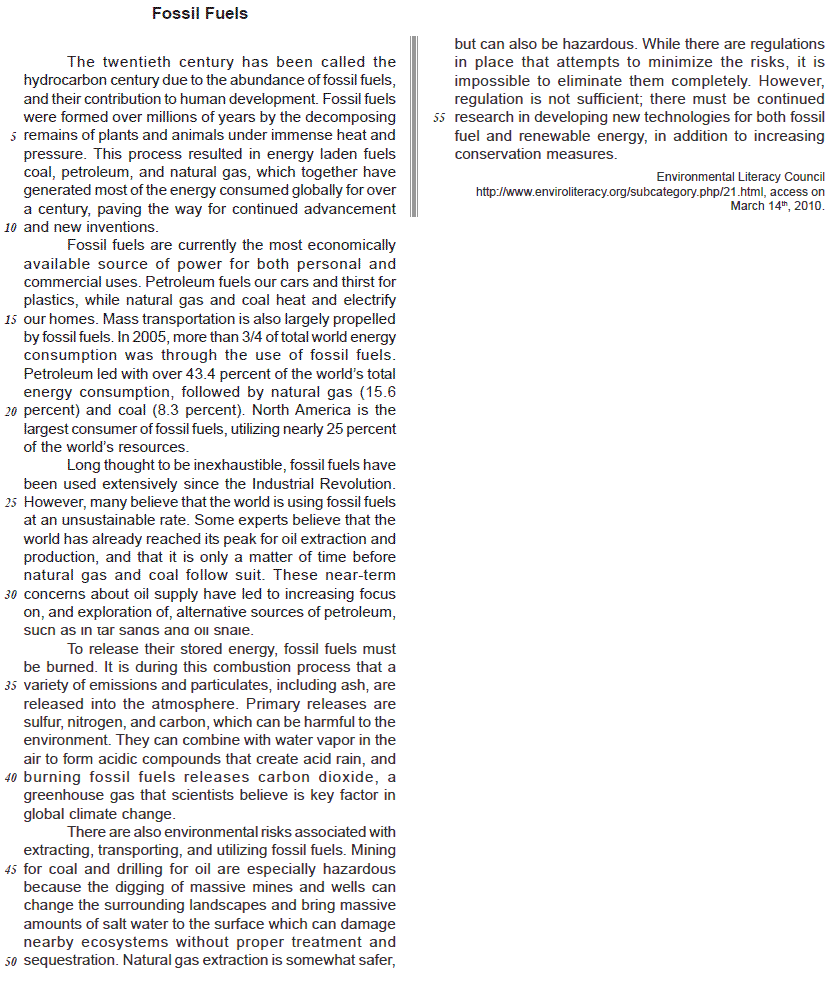
According to paragraph 4 (lines 33-42), all the elements below result from the burning of fossil fuels, EXCEPT
- A.
acid rain
- B.
water vapor
- C.
ash emissions
- D.
greenhouse gas
- E.
sulfur, nitrogen and carbon releases
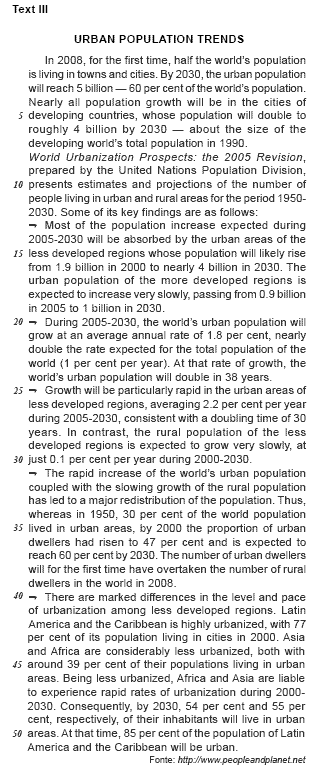
In the sentence "World Urbanization Prospects: the 2005 Revision, prepared by the United Nations Population Division, presents estimates and projections of the number of people living in urban and rural areas for the period 1950- 2030." (lines 8-12), the words "prospects", "estimates" and "projections" can be suitably translated as, respectively,
- A.
prospecções – estudos – projetos.
- B.
prospectos – avaliações – perspectivas.
- C.
perspectivas – estimativas –projeções.
- D.
expectativas – cálculos precisos – previsões
- E.
probabilidades – estatísticas – planejamento.


